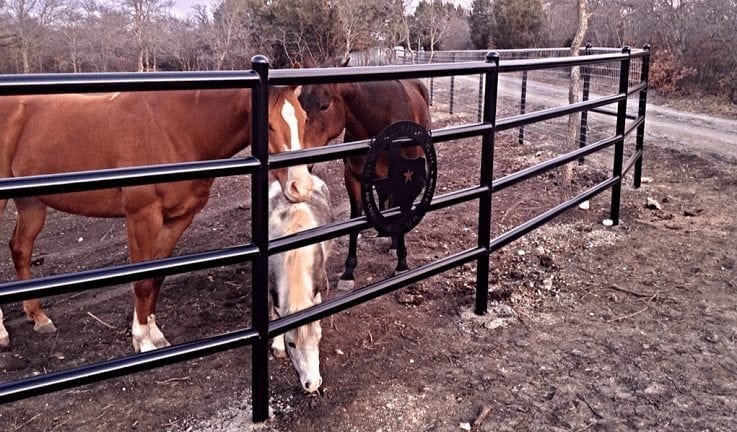
Livestock fencing has two main purposes: to keep your animals safely contained, and to prevent predators from getting in and eating them. But there’s not a one-size-fits-all solution. The correct fence depends on what type of animals you aim to contain.
No matter what type of livestock you’re raising, make sure your posts are big enough, and that corner fence posts are set deeply into the ground, especially if your soil is soft. And don’t forget the gates—since horses and livestock occasionally need to be moved or corralled into different areas, they’ll need a way to get in and out.
There are several fencing options to corral and secure animals while allowing free roam of a pasture. These options vary from wood and wire to composite fencing, but the most durable choice for farmers today is pipe fencing.
Which Fence Type Is Right For My Animals?
Whether you plan on installing a temporary or permanent fence, the installation needs careful planning in order to best protect livestock. Here are a few questions to start:
- What is my stockade fence being used for? (Boundary fence, divider fence, cross-fence etc.)
- What type of livestock is the fence for? (Sheep, horses, cattle, pigs, chickens etc.)
- What type of fence is best suited for my purpose?
- Which is a higher priority (low cost, security or durability?)
- Where do I need the fence? (Gate location, setting of posts, stock gaps, cattle guards, etc.)
Cattle Fencing
Confining cows is an easy feat, as they are docile and rarely attempt to break out of pens. Longhorn steers and bulls require a little more security. Factors to consider include:
- Fence life expectancy
- Ease of installation/construction
- Expense
Pipe fencing is popular with dairy and beef cattle farms. We suggest pipe fencing at least 54 inches in height with heavy posts and thick-gauge metal. Cattle guards can be installed at driveway and walkway gate entrances to prevent escape. We recommend treated wood posts and high-tensile wire. Separating cows from bulls? Up your wire gauge and fortify those posts.
Horse Fencing
If a horse can’t clearly see the fence, it’s likely to run right into it, potentially becoming tangled or injured. Horses are visual creatures making high tensile or pipe fencing a great option for a horse paddock. When using pipe fencing, it’s best to post pipes close together with a marker where the wires are. This helps horses to easily see their barriers. Since horses are also athletic creatures, barbed fencing is not advised and should be avoided to prevent injury. A more budget option to pipe fencing are wood post and board fences, which are sturdy, visible and attractive.
Goat & Sheep Fencing
These crafty guys and gals are escape artists. If you don’t want to get your cardio exercise by chasing goats, you’ll need to space your posts closely together and use special material, such as goat net wire fencing. Sheep are fairly docile, so the main concern is protection from predators. Barbed wire isn’t always effective at keeping coyotes and dogs out. Electric or extremely sturdy fences with accessories like spears can prevent an attack.
Hogs & Pig Fencing
Swine or pigs are very intelligent, and can easily escape if strong fences and gates are not used. Although a shorter fence can be installed, it needs to withstand the full weight of an adult boar. The trick to confining pigs is to prevent them from rooting underneath—a solid footer combined with a strong fence will stop them. The heavy-gauge wire of feedlot panel fencing is a good choice.
Wild Game and Exotics
Texas private game ranches offer hunting of boar, deer, elk and more. At Buzz, we’ve assisted the Dallas Zoo for several exhibits and understand the complexities of containing wild game. Deer and elk require the tallest of all livestock barriers. White-tail deer can jump nearly eight feet high! Whether you need to contain Bison or alligators, the team at Buzz as over thirty years of experience working with ranchers and farmers.
A note on electrification
Electrified fencing is popular for containing all sorts of animals. At Buzz, we don’t think shocking animals is very nice. Plus, you could be liable if a person, or somebody’s pet, gets shocked.
Need help?
Need help containing your critters? Your friends at Buzz are experts at safely containing all sorts of animals. Give us a call today and we’ll help you decide what will work best for your land and livestock.
